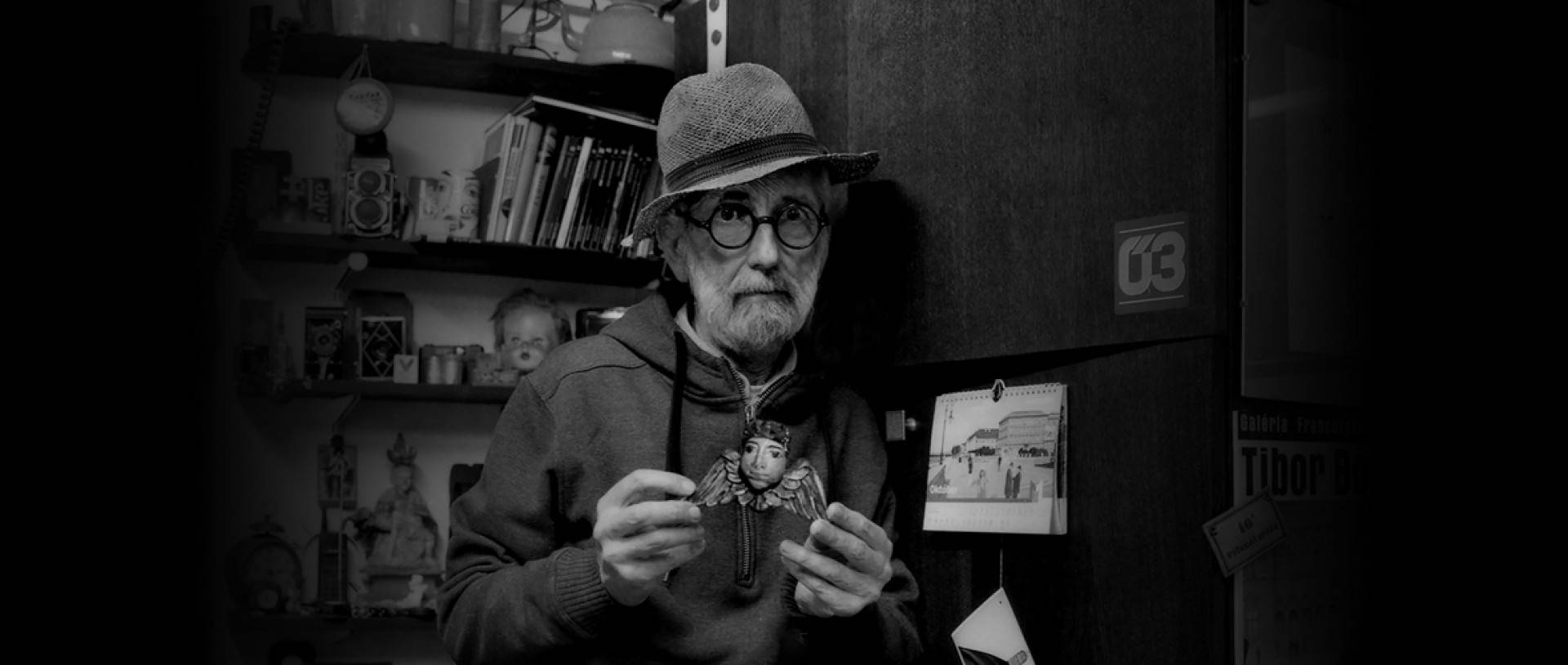

H A R M O N Y
When looking again through Tibor Borský’s photographs of composer and musician Marián Varga, either alone or with fellow musicians or composers, it suddenly occurred to me that I had never had such a unique opportunity – to compare the portraits of the main protagonist captured by a photographer and the image of that person which I had created myself based on various meetings, talks and memories.
Marián liked to talk. He never held back, he always said what was on his mind; he never forced his opinion on anyone, but he also never changed his opinion according to the way the wind blew. He used precise words. When we were lost in boring days, he used to say: “The days are dragging but the years are flying.” We used to meet in his apartment on Kozia Street in Bratislava. The piano, gramophone and records, paintings from friends and books dominated the rooms. And cigarette smoke, later replaced by cigar smoke. We could stop by anytime, even when he wasn’t home. He never locked the door to his apartment. Marián was also a great reader. Perfect pitch was not his only quality. He also had an amazing music memory thanks to which he quoted sentences from his favorite writers, word for word, in the exact rhythm and melody of the words, with all the commas and accents. Memories of Marián are like bright sparks. There is always light in them.
And I can find the same light in all of the photographs of him taken by Tibor Borský. The cover of the Collegium Musicum double album – Konvergencie from 1971 is a metaphor of his never locked front door: in this photo Marián, in his unbuttoned and widely open jacket, captured in a sincere and even defenseless gesture, welcomes us to his place. The cigarette in the corner of his mouth, retouched by a communist censor, was missing; today we can see it in the original version as evidence of his smoking passion, which he aptly expressed in the sentence: “My existence is smoking interrupted by life.” Very few things render Marián’s image as accurately as his connection with clouds of cigarette smoke. He was always unique and exceptional, and Tibor Borský’s photographs, which capture all of this truthfully, are equally exceptional.
These photographs are an example and the result of persistent work as well as talent that led the photographer to the realization that he must first stick to his theme for a long time, identify with his subjects and constantly return to them, in order to gradually compose a relationship between what he can see and what he himself is, and eventually he will achieve the person’s kindhearted trust and even affection for him and his camera which can be felt in every single photograph.
A kind of simple power of silence – the silence of recordings and the silence of messages, this is what captivates and excites me again and again about these photographs. They are indeed quiet, but never without their voice. Photographs are visual reflections of the world which exists within their creators, and like Tibor Borský, they offer them to us, because perhaps we would not notice them otherwise.
Photograph is a word. It invites us to engage in a conversation. For Tibor Borský, taking photographs is an act of discovery, transformed into an act of creation. His portrayal of Marián Varga and the final portraits in his photographs are in living harmony.
They are not just for observing.
They also carry music.
Dušan Dušek
Tibor Borský was born in Bratislava in 1939. He studied at the Secondary School of Applied Arts in Bratislava and from 1963 to 1967, before studying at the Film and TV School of the Academy of Performing Arts in Prague, in the Department of Film and TV Image, specializing in artistic photography under prof. Ján Šmok and prof. Josef Ehm. After completing his studies, Borský photographed the “Czechoslovak New Wave”. He cooperated in the films of Juraj Jakubisko Kristove roky (Crucial Years aka Christ’s Years) and Dovidenia v pekle priatelia (See You in Hell, Friends); Miloš Forman Hoří má panenko (The Firemen’s Ball) and others directed by Elo Havetta, Pavel Juráček and Jarolím Jireš. In 1972 he began to photograph for the newly established OPUS Records. He was involved in several genres, primarily documentary and commercial photography. He created posters and covers of the Collegium Musicum’s records, including the legendary Konvergecie, Zelená pošta, Divergencie, Live and others. He regularly photographed for the most important magazines in Czechoslovakia and exhibited at many collective and solo exhibitions in Slovakia and abroad. In 1972 he became a member of the Union of Slovak Fine Artists, presently known as the Association of Slovak Professional Photographers at the Slovak Union of Visual Arts. In 2019 Borský won the title Osobnosť slovenskej fotografie (Personality of Slovak Photography). He has published several books such as Obrázky Bratislavy (Pictures of Bratislava, 1998); Karpatia in 2016; and London in 2021.




















